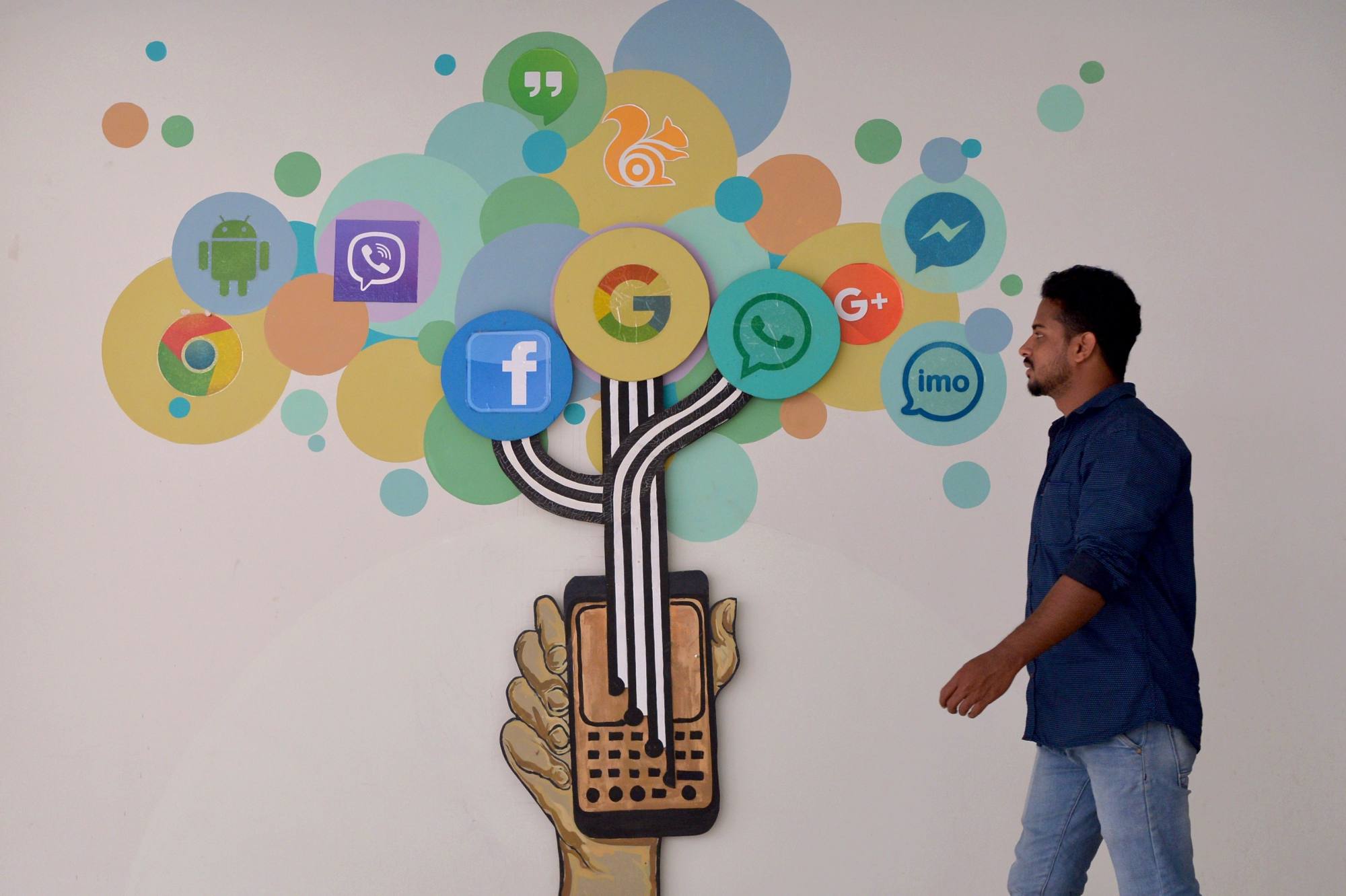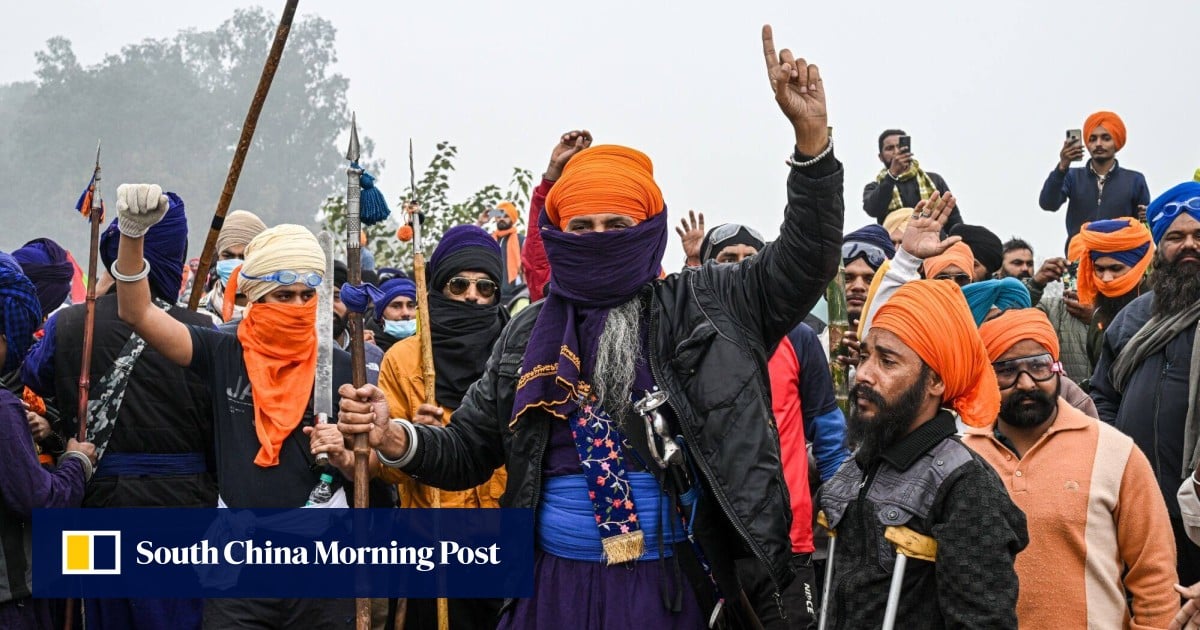While the government’s rationale behind the internet shutdown is to combat fake news as protest violence between farmers and police escalates, analysts and critics are warning the blanket digital ban is an alarming authoritarian move ahead of the general election.
Indian farmers vow to march on even as police allegedly fire pellet guns
Indian farmers vow to march on even as police allegedly fire pellet guns
Over the past week, the protest scenes have turned chaotic with police using tear gas, rubber bullets and what some claim are pellet guns against demonstrators. On Wednesday, a 21-year-old farmer was reportedly killed in the clashes after he was struck by a bullet fired by the Haryana police. Farmers halted their protest for two days following the youth’s death.
The government initially prolonged the suspension of mobile internet from February 13 to February 15. However, on Wednesday, it further extended the suspension until Friday.
“I can’t fathom why anyone in today’s world would block the internet and make people suffer so much. As a student, my time is precious, and I need internet access for many topics in my studies. Without it, I feel like I’m in jail,” Singh lamented.
Like her, thousands in the northern regions of India’s Punjab and Haryana are struggling with the internet blackout. The Indian government’s justification for the move is to mitigate the “spread of misinformation and rumours across various social media platforms”.
Many individuals who spoke to This Week in Asia expressed dissatisfaction and a sense of injustice over suspended internet services, arguing the situation only exacerbated their difficulties.
How fishermen who ply the Arabian Sea are ensnared by India-Pakistan rivalry
How fishermen who ply the Arabian Sea are ensnared by India-Pakistan rivalry
Balpreet Singh, 28, from Khanauri, Punjab, a gig worker, has been desperately checking his mobile phone, hoping to get connected. He has not been able to earn much in the past week due to a lack of online delivery orders.
“This is unfair for someone whose income depends solely on the internet. I am the sole breadwinner for my family of three, and I cannot afford to lose a week’s worth of work. My wife requires medication and it becomes challenging to cover our daily expenses when I earn nothing,” he revealed.
Raman Jit Singh Chima, Asia-Pacific Policy Director at Access Now, a global digital rights organisation, argues that internet shutdowns represent a consistently disproportionate and unjustifiable measure, severely infringing upon individual’s rights.
“In India especially, where reliance on the internet for communication with family, work-related tasks, and access to critical resources like transportation is steadily increasing, the ramifications are profound. Many essential services, including those utilised by gig workers, rely heavily on internet connectivity.
“Therefore, these shutdowns not only impede social lives and human rights but also jeopardise livelihoods and the ability to thrive in India,” Chima said.
“Furthermore, it is our firm belief that internet shutdowns have such a disproportionate impact that they cannot be justified in a constitutional, rule-of-law-focused democracy like India.”
‘Collective punishment’?
Critics have pointed out the data appears to contradict the pride and promotion of Modi’s vision of a “digital India,” which he has championed since taking office in 2014.
Digital experts have noted a surge since 2020 in India’s utilisation of internet shutdowns, surpassing even authoritarian regimes such as Russia, Sudan, Iran, Myanmar, and Ethiopia. This period has marked a trend toward digital authoritarianism, notably triggered by responses to various protests in India.
Much of this trend can be traced back to August 2017 when the Indian government issued a rule under the Telegraph Act, granting legal authority for such shutdowns. Before this, there was legal ambiguity surrounding the permissibility of such a move in India.
The alteration in the Act was seen as beneficial to the BJP government, particularly when it unilaterally revoked the semi-autonomy of Indian-administered Kashmir and imposed an 18-month internet blackout. Also, last year, the northeastern state of Manipur experienced an indefinite internet shutdown, causing widespread devastation among its people.
India’s tech world faces ‘wake-up call’ as big names Paytm, Byju’s falter
India’s tech world faces ‘wake-up call’ as big names Paytm, Byju’s falter
“Unfortunately, India has become the number one country for internet shutdowns for several years. We have seen a clear trend by regularly shutting down the internet, by the largest amount compared to other countries,” Chima said.
Aakar Patel, a prominent journalist and author, told This Week in Asia, that such actions were undemocratic and had trickle-down effects on state administrations.
“In large parts of its conduct, the government of India (GoI) doesn’t operate in a democratic fashion,” Patel stated. “The idea of collective punishment, where the entire population suffers due to perceived threats, has unfortunately become normalised, particularly evident in Kashmir.”
He warned: “India’s path forward could lead to either sustained repression or a worsening of existing grievances, as evidenced by the ongoing farmer protests.”
The Indian government has not only imposed an internet ban amid the ongoing farmers’ protest but has also issued two sets of blocking orders for social media accounts and links related to the protests, with 177 links and accounts blocked, including 42 X accounts. Most accounts withheld or suspended were critical of the BJP government.

On Thursday, X, via its Global Government Affairs account, announced it would withhold some accounts and posts in India following government orders despite disagreeing with the action and citing freedom of expression.
“The Indian government has issued executive orders requiring X to act on specific accounts and posts, subject to potential penalties including significant fines and imprisonment. In compliance with the orders, we will withhold these accounts and posts in India alone; however, we disagree with these actions and maintain that freedom of expression should extend to these posts,” the platform said.
Digital experts contend that the substantial increase in web censorship and internet shutdowns just weeks before India’s general election, which is expected to be held between April and May, is deeply concerning.
Mishi Choudhary, a digital lawyer and online civil liberties activist, told This Week in Asia that there had been a noticeable increase in content takedown and blocking of social media handles related to the farmer’s protests.
“No platform provides any information on why this is being done, voting Rule 16 confidentiality obligations. This black hole is continuously exploited by GoI to carefully curate information available to Indians.”
Is India’s new law for common civil code fanning Hindu-Muslim divide?
Is India’s new law for common civil code fanning Hindu-Muslim divide?
The activist further questioned how citizens could exercise their right to peaceful assembly if all protests were deemed as a public emergency or matter of public safety.
Digital legal expert and activist Apar Gupta highlighted that X served as a reliable medium for farmers during their protests in 2020-21. The platform was instrumental in issuing official press releases, documenting police excesses, fostering community, and garnering sympathy for their cause through hashtags. It emerged as a crucial informational conduit for farmers to articulate their demands and counter disinformation.
“The situation today is different. Blocking orders for Twitter [now X] accounts of farm leaders have been issued in advance. This form of pre-censorship is without any transparency or natural justice,” he explained.
“Globally, bills are being tabled advocating for the right to the internet as a basic human right. However, in our part of the world, internet shutdowns are being enforced upon us,” said Daljeet Singh, a PhD scholar. “As a scholar, my days begin with the internet and end with logging off from it. Nowadays, with no internet available, I need to make dozens of calls to my friends in other states just to check minute details related to my research project.”


